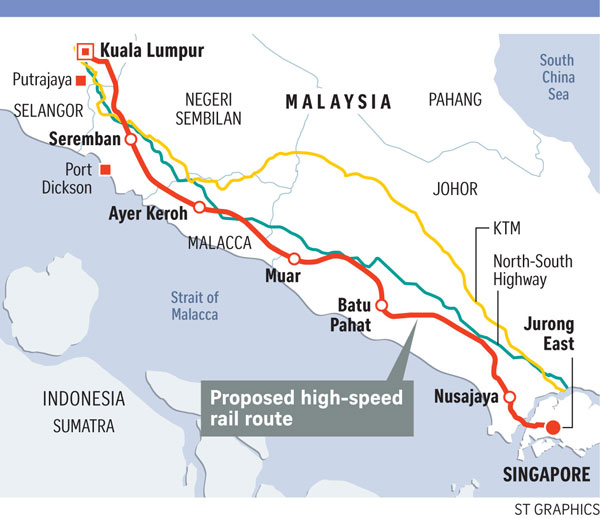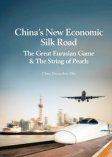Mahatir Scraps KL-Singapore High Speed Rail Connection
Malaysian Prime Minister Mahatir Mohamad has scrapped the long-planned Kuala Lumpur to Singapore high speed rail, dashing China’s Belt and Road ambitions of a continuous high-speed rail connection from its Kunming Yunnan border province all the way down to Singapore.
In addition to seeing the rail project as an element of its southeast Asia connectivity agenda, China hoped to win the tender for its high-speed trains to run on the line. Tenders had not yet been signed for the rolling stock provider, while local firms had been selected to construct the rail line.

Malaysia’s PM has also called into question the future of the East Coast Rail Link, a China-led project where construction began in August 2017. The US$13.1 billion project comprises 23 stations, starting at Port Klang on the west coast near Kuala Lumpur, crossing the Malaysian peninsular, and then heading north up the coast to end at Kelantan near the Thai border.
A framework finance deal and construction agreement was signed in November 2016, with state-owned China Construction Communications Company as the main engineering, procurement, and construction contractor. Project completion on the 668 kilometer line is scheduled for completion by 2024.
On June 1, 2018, in response to media queries about the reported cancellation of the Kuala Lumpur-Singapore High Speed Rail project, Singapore Transport Minister Khaw Boon Wan issued a statement. “Following media reports that Malaysia has decided to terminate the HSR, Singapore has requested the Malaysian government through diplomatic channels to clarify Malaysia’s position on the project,” he said. “We have informed the Malaysian government that Singapore is continuing to incur costs on this project, as it awaits Malaysia’s clarification, and that in the event Malaysia terminates the project, Singapore will study the implications and exercise our rights (including any right to compensation for expenses incurred) in accordance with the terms of the HSR Bilateral Agreement.”
He added that Singapore still believes that a high-speed rail link between Singapore and Kuala Lumpur would be in the economic mutual interest of the two countries. “Singapore continues to support the HSR project and to fulfill all its obligations under the agreement,” said Khaw, who is also coordinating minister for infrastructure.
Elsewhere in the region Xinhua News Agency reported on June 1 that Thailand’s transport minister, Arkhom Termpittayapaisith, said that the construction of a Thai-Chinese high-speed rail link between Bangkok and Nakhon Ratchasima in northeastern Thailand is expected to get fully started early in 2019 following a tender process later in 2018.
Arkhom, who co-chaired the 24th meeting of the Joint Committee on Thailand-China Cooperation on Rail Project with Ning Jizhe, deputy head of China’s National Development and Reform Commission, said the construction of the main sections of the first phase of the high-speed rail from Bangkok to northeastern province of Nakhon Ratchasima will start in March 2018.
In addition, the 350 kilometer high-speed rail link between Nakhon Ratchasima and Nong Khai, which faces the Lao capital Vientiane across the Mekong River, will be implemented by Thailand with China acting as consultants in terms of feasibility study and design, Arkhom was quoted as saying.
“Malaysia’s Prime Minister is well known as an autocratic leader with strong views concerning Singapore”, comments Chris Devonshire-Ellis of Dezan Shira & Associates. “Both Singapore and China will be disappointed by this news. I suspect the reason may be to do with previous antagonisms between Mahatir and Singapore, the possibility that quite correctly he will want to be looking into these projects for corruption assessments as the previous government seemed to have become tainted with this problem. Third, the air route between KL, Bangkok, and Singapore is highly lucrative and there has long been political pressure not to introduce competition by rail. But I am sure in time this project will be revisited.”
About Us
Silk Road Briefing is produced by Dezan Shira & Associates. The firm handles foreign investment into Asia, and has offices throughout the region including Singapore and Kuala Lumpur. For more information please contact asia@dezshira.com or visit us at www.dezshira.com
 Related Reading:
Related Reading:
![]() EAEU Prioritizes Free Trade Agreement with Singapore
EAEU Prioritizes Free Trade Agreement with Singapore
![]() China’s Silk Road Gold Fund – The South-East Asian Gold Deposits
China’s Silk Road Gold Fund – The South-East Asian Gold Deposits
China’s New Economic Silk Road
This unique and currently only available study into the proposed Silk Road Economic Belt examines the institutional, financial and infrastructure projects that are currently underway and in the planning stage across the entire region. Covering over 60 countries, this book explores the regional reforms, potential problems, opportunities and longer term impact that the Silk Road will have upon Asia, Africa, the Middle East, Europe and the United States.






